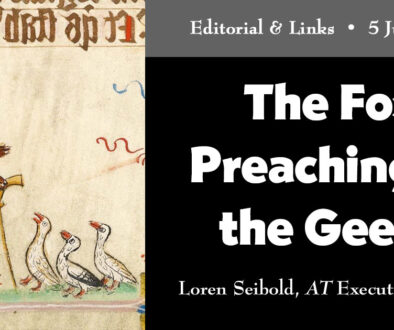Moral Influence or Substitutionism?
5 July 2019 |
Dear Aunt Sevvy,
Recently a man preached at our church who explained the atonement as Jesus just showing how much he loves us. I was furious that someone would stand in our pulpit and preach this “moral influence theory” heresy, because the Bible clearly teaches that Jesus was killed to satisfy God’s wrath against us for our sinfulness. So I turn to you, Aunt Sevvy. How do we get rid of this kind of unorthodox garbage from our church, and start preaching the truth?
Signed, Hardcore Subtitutionist
Dear Hardcore,
You knew when you wrote this that Aunt Sevvy rarely comments on the more abstract aspects of theology. But Auntie might surprise you here, because she does have something to say about this:
While there is an underlying philosophical question here that has been important to some theologians in the history of Christianity, as a practical everyday thing this question really doesn’t matter very much at all—and surely not enough to merit anger toward someone who preaches about God’s love.
Yes, I know this is the kind of stuff that Christians talk to one another about. To call again on your word “substitution,” I sometimes think we substitute theological discussion for what Jesus called the “weightier matters of the law.” It was in this connection that Jesus said, “You blind guides! You strain out a gnat but swallow a camel!” (Matthew 23:23)
How does this argument help people know God? How does it help us be better, kinder people?
Short answer: it does neither.
Here is what is important: “I have set you an example that you should do as I have done for you” (John 13:15). That means loving as Jesus loves (Ephesians 5:1-2; 1 John 3:15-16) and forgiving as Jesus forgives (Colossians 3:13) and generally providing help and healing to those around us.
Or, to put it another way, “I would be like Jesus/ I would be like Jesus/ Help me Lord, to daily grow/ More and more like Jesus.”
Do you think that when Jesus gathers the sheep and the goats, he’s going to say to those on his left hand, “You held the moral influence theory. Go to hell,” and to those on his right, “You held the penal substitutionary theory that explained how wrathful I am. Thanks for being on the right side! Enter into the heavenly home I prepared for you”?
Auntie believes is more important to be like Jesus than to explain the atonement correctly.
I will make just one observation about you. Perhaps this is just an abstract philosophical discussion for you. But if you spend much time contemplating how furious God is, and how you need to make God’s wrath the “certain sound” of your trumpet, you may want to explore why that is.
Aunt Sevvy
 You can write to Aunt Sevvy at DearAuntSevvy@gmail.com. Please keep questions or comments short. What you send us at this address won’t necessarily be, but could be, published—always without your identity. Aunt Sevvy writes her own column, and her opinions are not necessarily those of Adventist Today’s editors.
You can write to Aunt Sevvy at DearAuntSevvy@gmail.com. Please keep questions or comments short. What you send us at this address won’t necessarily be, but could be, published—always without your identity. Aunt Sevvy writes her own column, and her opinions are not necessarily those of Adventist Today’s editors.




